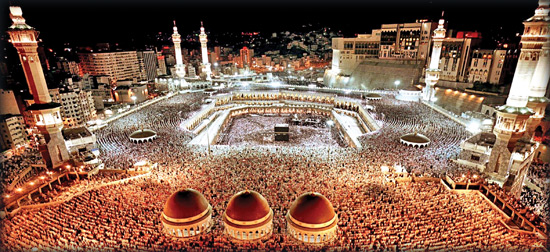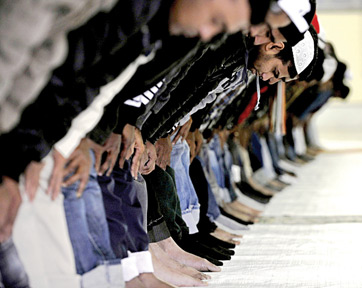Haj the festival of sacrifice
By Husna Inayathullah
“May Allah’s blessing light your way, strengthen your faith and bring
joy to your heart as you praise and serve Him today, tomorrow and
always.” Eid Mubarak!
 Muslims all over the world anticipate the annual three-day
celebration of a historical event that took place thousands of years ago
during the time of Prophet Ibrahim. Muslims all over the world anticipate the annual three-day
celebration of a historical event that took place thousands of years ago
during the time of Prophet Ibrahim.
This occasion is known as Eid-ul-Adha or the Festival of Sacrifice.
It is a representation of two significant Islamic events such as the
culmination of the Haj pilgrimage to Mecca and the sacrifice that Allah
commanded to Prophet Ibrahim of his beloved son, Ismail.
Eid-ul-Adha is observed on the 10th of Dhul-Hijjah, the last month of
the Islamic lunar calendar. While Muslims around the world celebrate
this day, it has particular significance for the pilgrims performing haj.
In Sri Lanka it is celebrated tomorrow according to the sighting of the
moon.
Eid-ul-Adha is associated with Haj. Allah had made the Haj mandatory
upon mankind initially during the time of Prophet Ibrahim. “And make a
proclamation of Haj to mankind; they will come to you on foot and on
lean camels from every distant quarter.” (Quran: Chapter: 22, Verse:
27).
The spread of idolatry across Arabia caused the rituals of Haj to
become extremely distorted. With the advent of Islam and Prophet
Muhammad, Allah restored Haj as the fifth pillar of Islam. Allah
described the correct manner in which it was to be performed in the Holy
Quran.
Allah has ordained that every able-bodied Muslim who can afford it
must perform the pilgrimage at least once in their lifetime. Several
main rituals constitute the framework of this experience.
Tawaf which means circulating the Kabah seven times, Sa’i which means
walking between the mounds of Safa and Marwah seven times, supplicating
to Allah at Arafat, the place where Prophet Muhammad gave his farewell
speech, proclaiming the final seal of Islam, and where Muslims believe
they will be resurrected on the Day of Judgment and stoning the pillars
that symbolise Satan at Mina, the place where Satan repeatedly
challenged Ibrahim to disobey Allah’s command to sacrifice his son.
Each of these prescribed acts is a step in the pilgrim’s difficult
journey towards spiritual cleansing. When the pilgrim successfully
executes these acts in the prescribed manner with utmost sincerity and
humility, all his prior sins are forgiven.
Final ritual
The final ritual that pilgrims must perform, signifying the
completion of these acts is the sacrifice of a domestic animal.
In addition to denoting the completion of haj, Eid-ul-Adha honours
the monumental sacrifice that was to be made by Prophet Ibrahim. He was
ordered by Allah to sacrifice his dearly-beloved son Ismail as a test of
obedience.
Ibrahim willingly submitted to Allah’s command, wherein Allah, by His
Mercy replaced Ismail at the moment of sacrifice with a lamb.
Ibrahim’s selfless act of obedience is commemorated by the sacrifice
of a domestic animal such as a lamb, sheep, cow, or goat, the meat of
which is then distributed to relatives, neighbours, and the poor. In
parts of the world that preclude Muslims from personally sacrificing an
animal, Muslims donate money to charitable organisations, which then
sacrifice the animal on their behalf and distribute the meat to the
poor.
In keeping with the following injunction of the Quran (22:27), “…and
pronounce the name of Allah over the cattle which We have provided for
them on the appointed days, then eat the meat themselves and feed the
indigent and needy.”
Eid-ul-Adha exemplifies the charitable instincts of Muslims in their
communal effort to see that no one is left deprived of the sacrificial
meat. It embodies the values of discipline and self-denial, and
submitting to the will of Allah.
Eid-ul-Adha is a joyous occasion marked with family traditions and
celebrations. The festivities begin in the morning after Fajr prayer,
where Muslims, dressed in their finest clothes, attend the
congregational prayer followed by a sermon.
During the festival of Eid al-Adha and the days preceding it, Muslims
recite the Takbir. This is particularly the case on the Day of Arafat.
The Takbir is the term for the Arabic phrase Allahu Akbar usually
translated as “God is the greatest.”
It is a common Islamic Arabic expression, used in various contexts by
Muslims in formal prayer as an informal expression of faith in times of
distress, to express celebration or victory, or to express resolute
determination or defiance.
 Upon completion of the services, people greet each other with the
blessings of Eid: ‘Eid Mubarak’. Thereafter, Muslims often visit the
homes of relatives and friends, partaking in delicious feasts customary
to their native cultures and often exchanging gifts, and many eagerly
anticipate the return of those friends and relatives who have made the
journey for Haj. Upon completion of the services, people greet each other with the
blessings of Eid: ‘Eid Mubarak’. Thereafter, Muslims often visit the
homes of relatives and friends, partaking in delicious feasts customary
to their native cultures and often exchanging gifts, and many eagerly
anticipate the return of those friends and relatives who have made the
journey for Haj.
Roots
Christianity, Judaism, and Islam- all trace their roots back to
Prophet Ibrahim known as Abraham who is thus known as the father of the
three monotheistic religions. Islam relates that Ibrahim had two wives,
Sarah and Hajar, each of whom bore a son, Ishaq and Ismail. Although
Hajar was initially Sarah’s maid, according to Islam, Hajar later
married Prophet Ibrahim and bore him a son, Ismail.
The lineage of Prophet Muhammad is traced to Ismail, whereas
Christianity and Judaism trace their roots back to Prophet Ishaq, the
son of Sarah. The sacrifice by Ibrahim is of importance in all three
monotheistic religions, although it is not commemorated by Jews and
Christians in the same manner as in Islam.
Christianity and Judaism, however, maintain that Ishaq, rather than
Ismail, was the promised son whom Allah had ordered to be sacrificed.
The sacrifice of the son of Prophet Ibrahim has historical
significance. Muslims celebrate the event through the festivities of
Eid-ul-Adha as customary to their native cultures.
Eid-ul-Adha is a time of remembrance of the trials of Prophet Ibrahim,
a time to celebrate the end of Haj, and a time that men, women, and
children of all ages greatly anticipate. |

